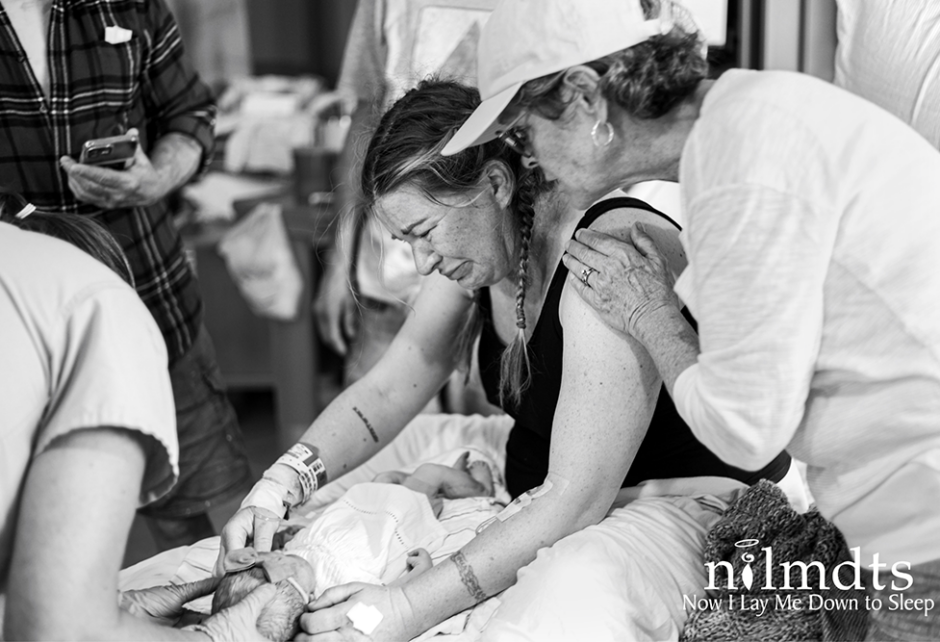
15 Things Nobody Tells You About Childbirth
Written by James Kicinski-McCoy
Photography by Photographed by Maria Del Rio
The joy and excitement of having a baby is a beautiful experience, but with that comes a lot of not-so-pretty things that most people (doctors included!) don’t always discuss. Even if you’ve read several pregnancy books, attended birth classes, and talked to your doctor, mid-wife, or mama friends about what to expect, they may not tell you everything. We’re not trying to scare you, and every birth is different. That said, we think it’s important to be fully prepared, because it’s likely that you will experience some of the following scenarios during and after labor.
You Might Freak Out. Let’s be real, even the most mentally prepared mamas end up having some degree of anxiety (whether minor or extreme) the second it comes time to push. Know that this is very normal and remember, just breatheee.
Transition Hurts. Obviously, contractions are going to hurt like hell, but the transition stage is the be-all and end-all of labor pain. Early contractions may feel similar to menstrual cramps, but will eventually escalate into advanced labor (transition), which is intense! Most moms say it’s so painful that the idea of your baby coming out actually seems like a piece of cake. Again, breathe and try not to fight the pain that comes with these long and frequent contractions—you’re almost there!
Your Water Might Not Break. Your water, otherwise known as amniotic fluid, doesn’t usually break and pour out like we see in the movies. Instead, it can be a slower flow that feels almost like pee, and it can keep trickling throughout the day. And for many, your water won’t break at all—only 15% of women experience it. If this is the case, your doctor may do it for you or it may break while pushing.
Au Naturel? If you are hell-bent on having a natural childbirth, make sure that your care provider completely understands what that means to you, because “natural” has different interpretations to different people. To some, a natural birth means a vaginal delivery, while others consider a going au naturel pain medication and intervention free. Make sure to research and discuss your options with your doctor or midwife.
The C-Section Route. Think scheduling a c-section delivery will be easier than a vaginal birth? You might want to think again. A cesarean section is considered major surgery and many mothers find it to be just as painful, if not more than a traditional birth. After delivery, simple things like showering, standing up straight, using the bathroom, and even laying down can be difficult and cause pain, leaving you somewhat immobile, often times medicated, and healing for up to six weeks.
Pain Free? For those looking to feel zero pain during birth (and chanting “Bring on the drugs!”), know that there are certain cases when the anesthesia doesn’t perform. If there are scars on the dural sac or if your individual anatomy simply doesn’t line up, medication can struggle to spread, therefore leaving you with some pain on half or more parts of your body during delivery.
Yes, You Might Poop. The rumor is true—it’s totally normal for women to go “number-two” during childbirth, after all, you’re pushing a baby human out with all of your might! For those cringing, doctors and nurses are completely used to it, and stress that if you do poop during delivery, you’re doing the right thing. Truth is, you probably won’t even notice, or care!
Birth Is Messy. If you imagined your birth experience being like those you’ve seen on T.V., you’re sadly mistaken. It’s messy and things will pass before, during, and after that you usually aren’t prepared for. You’ll lose your mucus plug (a thick, gelatinous mass that clogs up the cervix to keep your water intact) before labor. After delivery you may think that your work is done, but you will have to push out the placenta. And other fluids and all things TMI will continue to exit your body for several weeks, which is where those fabulous mattress-sized maxi-pads or briefs come into play.
Labor Time. The average duration of labor for a first-time mama is anywhere between 8 and 20+ hours, so being prepared with a comprehensive childbirth education class always helps make it through. Many mamas may also find that the second, third, and so forth child is a little easier and faster to deliver.
You May Need Stitches. Pushing a baby out may cause your vagina to rip or tear during delivery. That or the doctor may have had to perform an episiotomy to ensure you don’t tear extensively. Either way, that can result in pain or burning and sensitive stitches for weeks after giving birth. Your midwife or doctor will give you a handy squirt bottle to keep them clean and help the healing process.
A New You—Kind Of. After delivery, things will slowly start to go back to normal “down there”, but vaginal childbirth can cause the structure of your vagina and perineum to physically change, making it look, feel, and work a little differently than before. Bladder incontinence and vaginal dryness are both very common issues women face after childbirth and can linger for months after delivery.
Hemorrhoids Happen. During pregnancy, your growing uterus puts pressure on the pelvic region, causing varicose (swollen) veins, which can lead to internal or external hemorrhoids. Pregnancy also increases the hormone progesterone, which slows down your intestinal tract, causing constipation. You may also develop hemorrhoids during the second stage of labor. Either way, it’s best to do all that you can to avoid them before delivery, as constipation along with all the lingering pain, stitches, swelling, and soreness going on downstairs is no fun. Make sure to notify you care provider of suspected hemorrhoids and remember that Tucks Medicated Pads are our friends.
Breastfeeding May Not Come Easy. Not every mom is able to magically produce the perfect amount of milk after childbirth. There’s this expectation that breastfeeding should be easy and come natural to women, but it’s a learning experience for both you and your new baby. Many nursing mamas experience sore and dry nipples that can lead to bleeding and painful feeding sessions. Use a lanolin-based cream to help keep the nipples hydrated and hang in there. If you are having difficulty with your baby’s latch, sync-up with a lactation specialist to get on the road to nursing success.
Afterpains. You may experience postpartum pains that feel like minor or major contractions, especially when breastfeeding. These afterpains are caused by your uterus contracting as it shrinks back to it’s pre-pregnancy size. These annoying pains can last up to a six weeks, but are usually most intense the first couple of days after delivery.
The Sleep Withdrawl Myth. Yes, newborns are full-time jobs, but surprisingly, most of them sleep a lot. The average infant sleeps as much as 17-hours a day. Of course, you will have to frequently feed, nurture, and change your babe around the clock. But if you make sure to rest while your baby sleeps, or let your partner take over while you nap, it will help curb the zombie-mama effect that is widely heard of during those precious newborn days.
Sound scary? Just remember, you’re about to partake in one of life’s most beautiful and natural experiences. There’s a lot that comes along with giving birth, but you’re stronger than you know and our bodies were built for this! And, most of us tend to block out all of these short-lived obstacles soon after holding that tiny baby in arms.
Share this story



